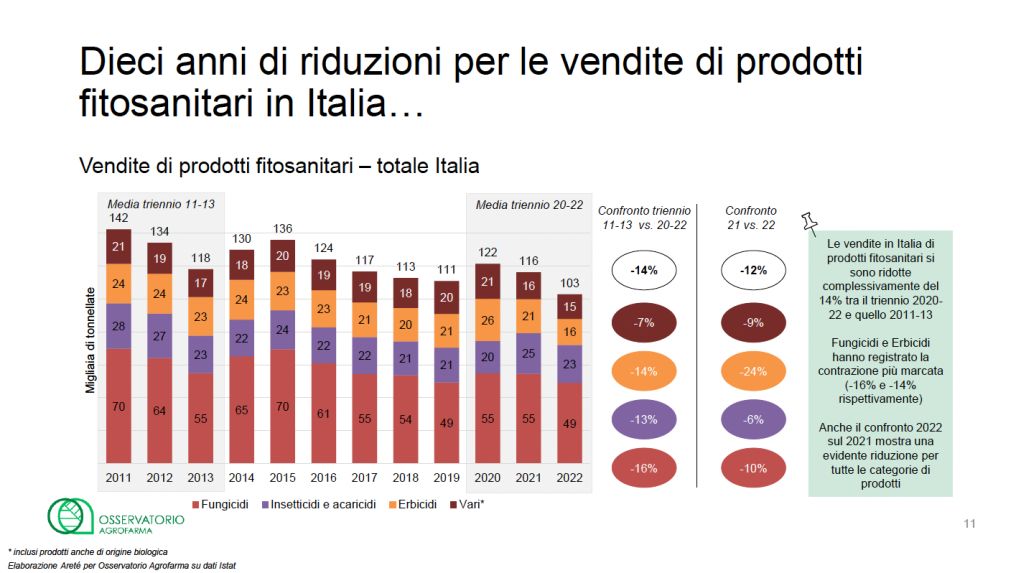ROME (ITALPRESS) – Italy confirms its leadership in terms of food safety, with 99.5 percent of samples with residues below legal limits. In addition, the agricultural sector continues to reduce energy use and its emissions, including greenhouse gases, by using agrochemicals in an increasingly optimized manner, as confirmed by sales over the past 10 years decreased by -14%. This is the picture that emerges from the latest data of the Agrofarma Observatory, a report that has been providing information on the state of the art of Italian agriculture and the agricultural sector for the past year.”The new numbers collected by the Agrofarma Observatory confirm the virtuous path of Italian agriculture, aimed at the rationalization of resources and the adoption of solutions increasingly oriented to sustainability,” said Paolo Tassani, president of Agrofarma-Federchimica. “With this project we want to overcome and counter the logic that associates the use of chemistry in agriculture with negative practices for the environment, providing a correct representation of our sector far from false myths and fake news that do not represent what is the real and daily commitment of all operators in the sector. The scientific responsibility for the project has been entrusted to Aretè, The Agri-food intelligence company, an independent research, analysis and economic consulting firm specializing entirely in the agriculture and food sectors. “The new update of the Agrofarma Observatory goes on to confirm the image of a sector with a high propensity for innovation, which is supporting the not easy path of our agriculture towards the progressive reduction of environmental impacts, while protecting production yields. The challenge is this: that innovation and technology run at a sufficient pace to defend agricultural productivity even in the face of the sharp reductions in inputs – agrochemicals first and foremost – that have been recorded for years now, also as a result of the boost given by sector policies,” says Enrica Gentile, CEO & Founder Aretè Srl.As anticipated, the improvement in agricultural environmental performance continues: in absolute terms, the Italian agricultural sector has the lowest overall emissions compared to the EU countries being compared (France, Germany and Spain). Ammonia emissions, in fact, continue to fall and the 2030 ammonia containment target agreed with the EU was reached well in advance as early as 2021, while the pathway to reduce greenhouse gas emissions also continues.It also clearly emerges the commitment of companies in the sector to the development of innovative and less impactful agrochemicals, demonstrated by the fact that more than 83% of the agrochemicals on the Italian market were approved or renewed after 2011.While the reduction in the quantities of plant protection products sold in Italy, which have decreased overall by -14% in the last 10 years, shows how the industry, for some time, has been committed to a path of constant optimization of the use of agrochemicals. A trend that, however, does not concern the category of products based on low-risk substances, which has grown by more than 6000%.Finally, for the first time within the Observatory, data related to climate and weather effects that have affected Italy in recent decades and whose effects are daily under everyone’s eyes were also analyzed. In fact, temperature and precipitation indicators that have the greatest influence on agricultural production, plant health and the availability of water resources were monitored.While average temperatures in Italy have been increasing since 1997 compared to the previous period, in the last decade the deviation has become more pronounced, with annual anomaly values always above +0.7 °C, accompanied by particularly irregular precipitation, suggesting increasing climatic variability. These factors have undoubted consequences on the productive capacity of different crops and the development of certain adversities, which our Enterprises are committed to countering through the development of increasingly innovative agrochemicals to safeguard agricultural productivity.The Agrofarma Observatory, therefore, brings out the high propensity of the entire sector for innovation, sustainability and safety, as well as a high level of attention to the challenges that the agricultural sector will have to face in the coming years, also due to the climatic events we are experiencing. In this context, Agrofarma Companies are at the forefront of providing farmers with products and solutions that, combined and integrated with each other, enable them to respond with increasing effectiveness and speed to the challenges that will arise.
– photo SEC Newgate press office for Agrofarma -(ITALPRESS).

